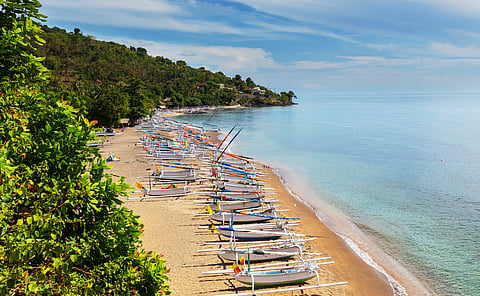
- Destinations
- Experiences
- Stay
- What's new
- Celebrating People
- Responsible Tourism
- CampaignsCampaigns
- SubscribeSubscribe
- Buy Now

Bali, one of India’s top travel destinations, attracts visitors with its stunning beaches, rich cultural heritage, religious significance, exciting activities, and breathtaking natural landscapes, from rice fields to waterfalls. If you are planning a visit to Bali, it is important to know the recently introduced rules for tourists. These guidelines have been implemented to address inappropriate behaviour and safeguard the island’s cultural integrity and sacred sites.
On March 24, Bali Governor I Wayan Koster announced new regulations for tourists. The directive was issued just a few days before Nyepi, a sacred holiday known as the Day of Silence on March 29. During this festival, the island comes to a standstill for 24 hours, requiring everyone, including tourists, to stay indoors.
The guidelines emphasise respectful behaviour at sacred sites and require the payment of Bali’s tourist levy. The regulations outline appropriate clothing and behaviour expected when visiting temples and religious complexes. Notably, they prohibit menstruating women from entering these sites.
The governor has also cautioned that certain violations may result in legal consequences under Indonesian law. “We issued a similar regulation before, but as things change, we need to adapt. This ensures that Bali’s tourism remains respectful, sustainable, and in harmony with our local values,” Koster said according to a report in the local newspaper The Bali Sun.
The new regulations introduced in Bali require that tourists wear modest and respectful clothing and behave appropriately at religious sites, restaurants, shopping areas, and public roads. Visitors are prohibited from swearing, causing disturbances, or disrespecting locals, officials, or fellow tourists.
The mayor has stated that sharing hate speech or misinformation on social media is also banned. According to the new guidelines, foreign tourists should observe and honour Balinese customs, traditions, and cultural practices, especially during ceremonies. Visitors must dress appropriately when visiting temples, tourist attractions, or public spaces.
Additionally, foreign tourists are not permitted to enter sacred temple areas unless they are worshippers wearing traditional Balinese attire. The guidelines also specify that menstruating women cannot enter these areas. Tourists are further prohibited from climbing sacred trees or monuments, as well as taking inappropriate or nude photos at religious sites.
Bali's new regulations for tourists include several other restrictions. Visitors are required to use licensed guides and stay in approved accommodations, adhere to traffic laws, and exchange currency only at authorized outlets. In February, Bali implemented a one-time entry fee of 150,000 Indonesian rupiah (€9) for international visitors to support conservation efforts. According to the new guidelines, tourists who do not pay this fee will be denied access to attractions, and those who violate these regulations may face legal consequences under Indonesian law. Recently, Balinese officials proposed a daily tourist tax similar to the $100 (€95) Sustainable Development Fee charged to most international visitors in Bhutan. Additionally, single-use plastics, including plastic bags, Styrofoam, plastic straws, and drinks packaged in plastic, are banned.
“We have prepared a special team to conduct an operation. Foreign tourists who are naughty will be immediately dealt with firmly,” said Koster.
In October 2024, in a significant move aimed at curbing disturbances caused by rowdy tourists, the city of Prague announced a ban on organised nighttime pub crawls. The decision comes after years of complaints from residents over loud, disruptive visitors, littered streets, and failed attempts to manage the situation. Italy introduced regulations to manage a surge in tourism by limiting traffic, selfies, and the number of people on beaches in popular Italian destinations like Rome, Florence, Venice, and Sardinia.
In September 2024, Indonesia took a significant step to protect Bali's natural beauty and cultural richness by temporarily suspending the construction of new hotels, villas, and nightclubs in certain tourist areas. This important move aimed to prevent overtourism and overdevelopment, safeguard the environment, and preserve the island's cultural heritage. It reflects a proactive effort to address concerns about the impact of land development on Bali's environment and artistic integrity. Read more about it here.
